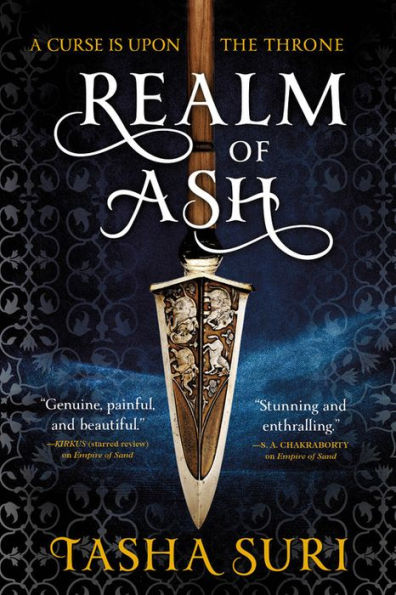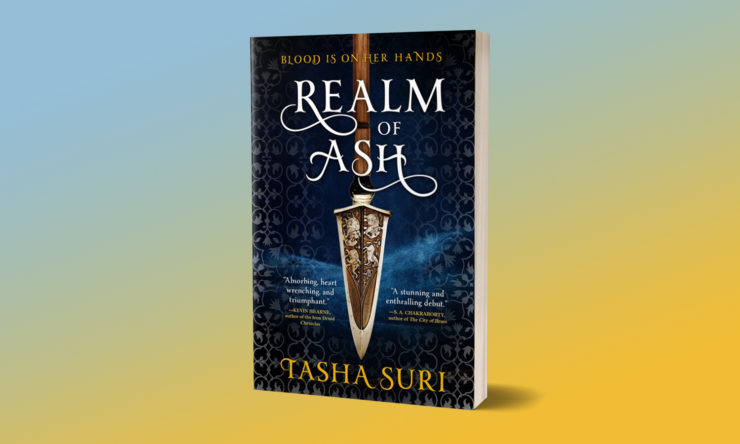Tasha Suri’s debut novel, Empire of Sand, proved her talent for epic fantasy and skill with characterisation. Two very different (but yet alike) people fought together to escape magical slavery and strike at the heart of centuries-old sorcery that smoothed the path of an empire. Suri’s worldbuilding evoked a richly detailed landscape—both in terms of the physical world and the socio-political one—and she balanced action and emotion with a deft hand. With Realm of Ash, Suri demonstrates not only talent, but consistency. This second novel is even more accomplished than the first.
Realm of Ash takes place in the same world as Empire of Sand, but the better part of a decade later. I believe it could be read as a standalone, but it benefits from the context of Empire of Sand.
We last met Arwa as the ten-year-old sister of half-Amrithi Mehr, Empire of Sand’s protagonist, acknowledged daughter of an Ambhan imperial governor, who has no memory of her mother and no real knowledge of the culture and history of the Amrithi people. The Ambhan empire has long persecuted and murdered the Amrithi as barbarians and heretics, and Arwa—very thoroughly socialised to be a good Ambhan noblewoman by her father and stepmother—believes that there is badness in her blood. Now she’s the only survivor of a massacre—due to that same blood and her Amrithi heritage, which she has learned all her life to suppress—and a young widow.
Widows in the Ambhan empire aren’t permitted to remarry. They have no socially sanctioned productive role except as their dead husband’s mourners. Arwa, angry and afraid, full of survivors’ guilt, is burning for a purpose, and she wants to lay down her life for the empire. She wants to prove that she’s better than her blood. That urge, and that blood, makes her a fitting tool for an imperial princess who’s seeking a solution to what most people believe is a curse upon the empire since the death of the religious figure known as the Maha—a figure readers of Empire of Sand will remember as a tyrant Mehr fought to escape.
In the princess’s household, Arwa is introduced to the princess’s bastard half-brother, Zahir, a young man who has always known his survival rests on his usefulness. He’s a student of forbidden arts, protected from execution largely by his princess-sister’s patronage and her belief that his scholarship might solve the nightmare horrors building in the empire. With Arwa and her Amrithi heritage, Zahir can finally search for answers in the realm of ash, where humans can find the echoes of their ancestors’ memories. What Arwa discovers there shakes her belief in the empire to its foundations.
Meanwhile, the emperor is dying, and Arwa and Zahir dwell in a household at the centre of the struggle for the succession. When it’s no longer in Zahir’s sister’s interest—or power—to protect him, they’re both forced to flee. In the desert of Irinah, ancestral home of the Amrithi, they face both the nightmare that has stalked Arwa since she survived the massacre of Darez fort, and the power of a new emperor whose rule is threatened by Zahir’s existence.
Buy the Book


Realm of Ash
It’s a very satisfying conclusion.
Realm of Ash isn’t packed with action or physical violence, though it includes both. It’s primarily concerned with the personal and the political (and the ways in which those things are the same), with interiority and self-discovery, and the slow growth of sympathy and affection between Arwa and Zahir. It’s a fantasy novel about the colonisation of the mind and the destruction of one’s culture, about the ways that imperial powers impose their own narratives and cut subject peoples off from their own histories and their own languages, and about the way in which assimilation is both a kind of safety (a new form of belonging and access to power) and a generational grief that never quite goes away. Arwa’s magical access to history and knowledge at the end of Realm of Ash comes at a serious cost, but her choice of what to do with it is a moment of exquisite power, an eloquent wish-fulfillment: I would like to return the knowledge, she says, knowledge she has gained from her ancestors, to her mother’s people, the Amrithi.
Realm of Ash is a compelling novel. Gorgeously written, deftly characterised, and packing a powerful impact into its 450-odd pages, it’s one of the most viscerally satisfying books I’ve read this year. (Turns out I have feelings about colonialism, memory, and power. Who’d have guessed?) I recommend it.
Realm of Ash is available from Orbit Books.
Liz Bourke is a cranky queer person who reads books. She holds a Ph.D in Classics from Trinity College, Dublin. Her first book, Sleeping With Monsters, a collection of reviews and criticism, was published in 2017 by Aqueduct Press. It was a finalist for the 2018 Locus Awards and was nominated for a 2018 Hugo Award in Best Related Work. Find her at her blog, where she’s been known to talk about even more books thanks to her Patreon supporters. Or find her at her Twitter. She supports the work of the Irish Refugee Council, the Transgender Equality Network Ireland, and the Abortion Rights Campaign.










